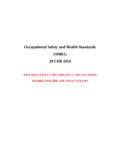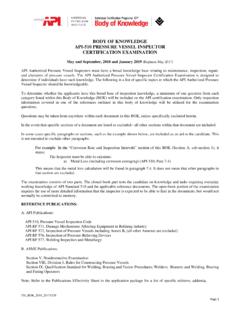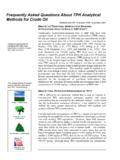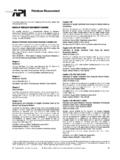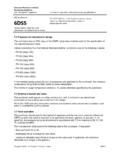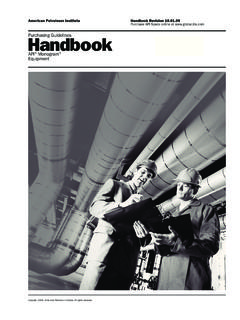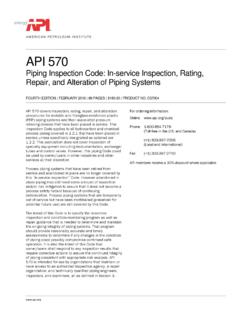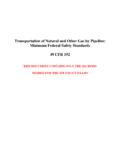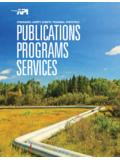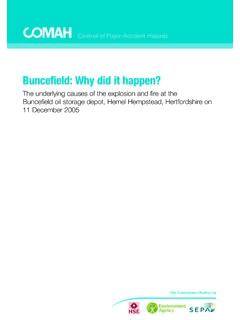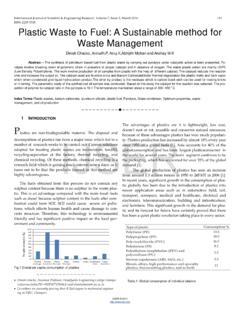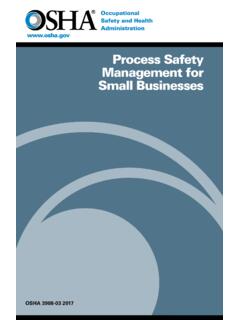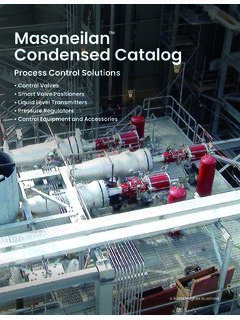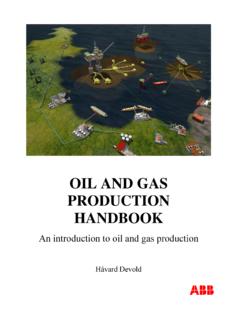Transcription of MECHANICAL INTEGRITY - American Petroleum Institute
1 MECHANICAL . INTEGRITY : FIXED EQUIPMENT STANDARDS & RECOMMENDED PRACTICES. JANUARY 2018. CONTENTS. AN INTRODUCTION TO MECHANICAL INTEGRITY : FIXED Pressure Piping Heat Transfer Storage 11. Pressure Relief Risk-Based 17. Damage INTEGRITY Operating 20. CORROSION AND Corrosion and 22. TIMELINE OF FIRST EDITIONS OF API MECHANICAL . INTEGRITY STANDARDS & OTHER NON-API MECHANICAL . INTEGRITY UPCOMING MECHANICAL INTEGRITY : FIXED EQUIPMENT STANDARDS & RECOMMENDED PRACTICES. 1. AN INTRODUCTION TO MECHANICAL . INTEGRITY : FIXED EQUIPMENT. M echanical INTEGRITY (MI) can be defined as the management of critical process equipment to ensure it is designed and installed correctly and that it is operated and maintained properly.
2 MI is 1 of the 14 elements included in the OSHA. Process Safety management standard. MI includes equipment/assets such as pressure vessels, storage tanks, piping systems, and associated hardware (valves, fittings, etc.), relief devices, and emergency shutdown/control systems MI encompasses the activities necessary to ensure that equipment/assets are designed, fabricated, installed, operated and maintained in a way that provides the desired performance in a safe, environmentally protected, and reliable fashion. In the early 1900s, the need to protect workers and the public from the hazards of boilers and pressurized equipment became apparent, so the industry began to develop design standards.
3 After World War II, a number of industry consensus standards were developed by the National Board Inspection Code (NBIC). By the 1980s, the American Petroleum Institute (API) led industry efforts to develop and implement TIMELINE OF IMPORTANT MI EVENTS. API RP 750 management of Process Hazards API 510 - Pressure Vessel Inspection Code 1990. 1958. | | | .. | .. | | | | | | | | | | | |. 1991. 1984. Bhopal Disaster API Std 653 -Tank Inspection, Repair, Alteration, and Reconstruction MECHANICAL INTEGRITY : FIXED EQUIPMENT STANDARDS & RECOMMENDED PRACTICES.
4 2. important MI standards, while the federal government also turned its regulatory attention to MI. API, industry, and the regulators have addressed MI head-on since the early-90s, particularly through the Occupational Safety and Health Administration's (OSHA) Process Safety management (PSM) program and the Environmental Protection Agency's (EPA) Risk management Program (RMP), as well as many additional Standards and Recommended Practices (RPs). published by API. API and AFPM jointly manage the Advancing Process Safety Initiative which is a joint effort to further advance process safety improvements in refineries and petrochemical plants by providing industry with more opportunities to communicate and share experiences and knowledge.
5 Through this partnership, API and AFPM collect process safety performance metrics, share process safety event information, produce and share Practices Sharing and Hazard Identification documents, host Regional Networks meetings, address issue- specific topics such as MECHANICAL INTEGRITY and Human Reliability. API also operates a program that assesses a site's Process Safety systems using independent and credible third party teams of industry-qualified process safety expert assessors. Through the use of industry developed protocols, the assessments OSHA PSM EPA Risk management API &.
6 Final Rule Program Final Rule AFPM. Advancing Process Chemical Safety Safety Board Baker Panel Refinery Programs formed founded Safety Review 2006. 2010. 1998. 1992. 1999. | | | | | | | | | | | | | | | | | | | | |. 1993. 2000. 2007. 2012. API 570 - Piping Inspection Code OSHA Refinery National Emphasis Program Effective Date API Publ 581 - First API Site Risk-Based Inspection - Assessment Base Resource Document MECHANICAL INTEGRITY : FIXED EQUIPMENT STANDARDS & RECOMMENDED PRACTICES. 3. evaluate both the quality of the written programs and the effectiveness of field implementation, including a site's MECHANICAL INTEGRITY program.
7 API has taken an active role in the creation and propagation of MI information and materials. API committees create Standards and RPs that address MI, largely in the areas of inspection and repair of pressure vessels, aboveground storage tanks, equipment reliability, corrosion, mechanics, and reducing capital and maintenance costs. These documents provide expectations on implementation and compliance, and many contain requirements in the form of shall statements, as determined by industry consensus committees. The creation of these industry-wide standards allows for procedures and practices to seamlessly continue at a company despite challenges presented by a dynamic and changing workforce.
8 Institutional knowledge is no longer limited to a few senior employees, and gut feeling is replaced with tried-and- true methods contained in the Standards and RPs. Because they must be applicable to many different sites, API committees write their documents in a way that still allows managers to operate in the most safe and efficient manner as dictated by their own facility's needs. The motivation for writing API MI Standards and RPs was based on safety, competition, and budgeting challenges, as well as myriad external pressures, but the adoption of these documents has led to more valuable inspection data, increased ability to handle changing process conditions, and the scheduling and budgeting benefit of planned inspections, among other things.
9 API Standards and RPs are periodically reviewed so that they remain relevant and valuable to the industry, and a review of past standards and updates shows how well the industry has adapted to changing times and MI science. This brochure is designed to acquaint the reader with the MI resources available in API Standards, Recommended Practices, and other helpful resources. The information is organized topically, and companion documents meant to complement one another are highlighted and listed together. MECHANICAL INTEGRITY : FIXED EQUIPMENT STANDARDS & RECOMMENDED PRACTICES.
10 4. EQUIPMENT. Pressure Vessels API 510. Pressure Vessel Inspection Code: In-Service Inspection, Rating, Repair, and Alteration Covers the in-service inspection, repair, alteration, and rerating activities for pressure vessels and the pressure-relieving devices protecting these vessels. This inspection code applies to most refining and chemical process vessels that have been placed in service. This includes: vessels constructed in accordance with an applicable construction code;. vessels constructed without a construction code (non-code) a vessel not fabricated to a recognized construction code and meeting no known recognized standard.
